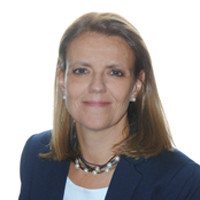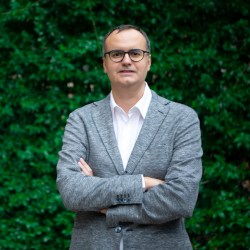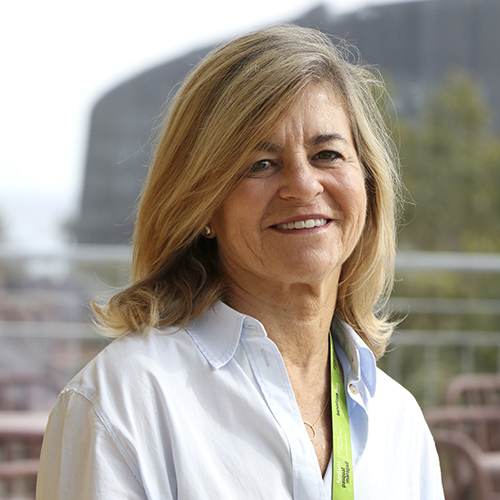15 years of Esade Alumni Social
Discover the experiences of former students who decided to change the course of their lives after their time in the project.

Eva Villamayor (Lic&MBA 95)
Head of Marketing and Communication at Hospital Sant Joan de Déu
“Working in the third sector, you can see that the work you do has a direct impact on a group that, for a wide variety of reasons, needs support and resources in order to achieve inclusion and normalisation in society. Personally, I have had the chance to be, for a period of time, in contact with people with Down syndrome. I could see that, when we talk about ‘capacities’ in relation to this group, they are not just words; they are a reality. Although I consider myself an open-minded person, I realised the obstacles and clichés that we carry with us. Meeting people with Down syndrome, spending time with them, talking to them and seeing their abilities and learning potential has been a gift.
Whatever their mission and social function, whatever their nature – association, foundation, etc. – we are talking about organisations. Therefore, they need a structure, professionalisation, the definition of functional and operational departments, etc., just like any other company. The obvious social function and impact should not be an obstacle to adopting policies and actions typical of a regular company. I think it is very important to maintain close collaboration between regular companies and NGOs in order to give these entities a boost. Likewise, although it may be risky to say this, I believe that the employment conditions of people who work for NGOs should be on a par with those of regular companies in terms of conditions and resources.”

Natalia Liñán (Dirección Estratégica de Comunicación 03)
Head of Marketing and Communication at the Capacis Foundation
“The main advantage of working in the third sector is that, at the end of the day, you can see the meaning of your work. When you work for a private company, you are rewarded financially for your achievements, but they don’t touch your heart. Now I work at the Capacis Foundation, which is dedicated to promoting the employment of young people with borderline intelligence. Every time a student is hired by a company, you see their happy face (and that of their parents) and they say: ‘Without you, we couldn’t have done it!’ That touches your heart and is really gratifying. Another advantage of working in the third sector is that there is so much to do, that you can develop your job by implementing new processes and procedures, taking on new functions, etc. My experience has been very good. I have been very lucky to find a team of professionals who give 120% every day at work, with joy and enthusiasm. This ends up being contagious. I had never experienced that sort of commitment to the projects we do with students. I had never seen that sort of motivation in a private company.
The third sector is becoming more and more professional, recruiting talent from the private sector. They need mixed teams: professionals from the third sector, experts in the mission, and professionals from the private sector, who provide a broader vision. They have realised that they have to be more competitive, because, although they never recognise it, there is also lots of competition in the third sector.
NGOs are necessary. They provide a fundamental service to society and meet needs that no one else pays attention to. What would become of all the groups that NGOs help? And of our environment? In my view, this social role is indispensable.”

Nicolau Brosa (Lic&MBA 99/ Liderazgo y Compromiso Cívico 15)
Strategic Plan Coordinator at the Pere Tarrés Foundation
“In management positions in the third sector, it is usually easier to achieve a work-life balance than in other sectors of the economy. Relaxed and collaborative work environments are also more common. Finally, there is the emotional return of contributing to a cause or a social project that you believe in. I started considering the third sector as a career option after participating in the Esade Alumni Pro Bono Consultants programme. Shortly thereafter, the possibility arose of joining the Pere Tarrés Foundation, coordinating the implementation of the strategic plan. I jumped at the chance. It is an exciting job that covers many areas, from a university faculty to the management of summer camps, educational leisure time in schools and a network of socio-educational centres in disadvantaged environments.
NGOs play a critical social role. In some sense, they play a watchdog role, influencing certain environments even before the government can detect that there may be a need in those environments. And the truth is that non-profit organisations, especially the larger ones, are becoming increasingly professionalised. Like all entities, NGOs must be managed in accordance with their mission and values, as efficiently as possible and with the utmost rigour. Ultimately, it is a question of being honest with your beneficiaries. And it is on the basis of this approach that I believe there is definitely a place for business and management profiles in NGOs.”

Ana Borrell (EDIK 1998)
Head of Strategic Donors at the Pasqual Maragall Foundation
“Personally, I like to work. I have been working since I was very young. If you work for a cause you care about and you can do your bit for social change, all the better. Your work has meaning and you meet very interesting people. I joined the third sector just a few months ago, after 30 years in the private sector. I made the change after the experience of coordinating Pro Bono Consultants for Esade Alumni Social. So far it has been very positive. The environment is very professional, young, generous and collaborative. In this setting, my experience generates a very interesting and productive combination. From what I’m seeing, the level of work is very high and multifunctional. You wear a different hat each day. It’s very creative and there is much more collaboration than competition.
Foundations are very professionalised nowadays. All my colleagues in management and executive positions have a very high level of training and come from high-powered positions in the private sector. You can bring an enormous amount of professionalism, experience and vision from other sectors, be it industry or services. The main difference is that the final destination of your professional contribution and resources is a scientific project and you have the chance to change the future of society. There is a lot of talent in the third sector. The more talent there is, the faster we will reach our milestones and achieve change.
I understand that there are some life circumstances that may prevent you from being professionally ‘active’ in this sector. However, there are many ways for people in the business world to collaborate. I meet all kinds of people who are fighting to raise awareness in companies, convincing employees and customers to contribute whatever resources they can to the third sector. It all adds up.”


































